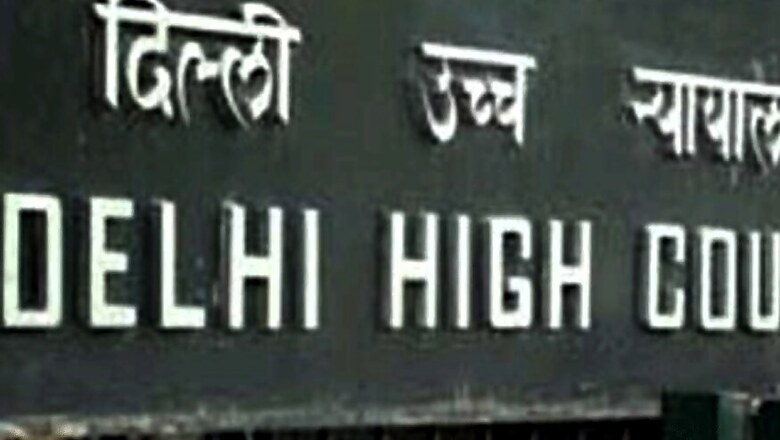
views
New Delhi: An erroneous approach of the trial court led to "miscarriage of justice" for a man convicted of allegedly raping his minor daughter 17 years ago, but justice was finally delivered to him when the Delhi High Court acquitted him on Wednesday — 10 months after he died while maintaining his innocence until the end.
The high court noted that neither the probe nor the trial was fair in the case, lodged following a complaint by his daughter, which resulted in him being sentenced to 10 years in jail.
Justice RK Gauba said the accused "had been crying foul from day one" by claiming that some boy had abducted and seduced his daughter, who was found to be pregnant when the FIR of rape was lodged in January 1996, but the investigating agency and the trial court paid no heed to his contentions.
The father had asked for a DNA test of the foetus by taking samples from the boy in question as well, but the police did not listen and the trial court did not issue any directions for such an investigation, the high court noted.
"The investigation was clearly one-sided. At this distance in time, this court can only deplore the inaction on the part of all concerned. In the considered view of this court, there are many a fact and circumstance which have unfortunately been glossed over by the trial court but which render the account given by the prosecutrix to be wholly improbable and unreliable.
"Additionally, this court is of the view that neither the investigating agency nor the trial court were fair to the appellant at any stage of the process, this also vitiating the result of the probe and the trial," the high court said in its judgement acquitting the man, who died in February this year. His wife had continued with the appeal.
The high court said that the prosecution and the trial court picked out "easy solutions" and the need for a deeper probe, as demanded by the man right from the start, was given a go-by.
"The defence evidence, particularly of the close members of the family was discarded. It is sad to note that the trial judge blindly accepted the prosecution story without going into the aspects which render it highly improbable, virtually impossible.
"The erroneous approach of the trial court has led to serious miscarriage of justice in the present case unreasonably holding the biological father of raping his own daughter in the teeth of loaded circumstances showing her to be of wayward ways and possibly in liaison with a male acquaintance," it said. It also noted that the kidnapping FIR lodged by the father, after the then 16-year-old girl went missing, was closed without any probe after she lodged a complaint that he had been raping her since 1991.
Referring to the facts narrated by the girl before the trial court, the high court observed that "there was no inhibition" on the girl to report the matter and since according to her the rape began from 1991, nothing stopped her from communicating it to her mother, her siblings or other elders in the family.
"The delay is indeed inordinate and there are no justifiable reasons for failure to lodge protest.. The conduct is undoubtedly unnatural and highly improbable," the high court said adding that if he she had been raped in 1991 when she was just 12-years-old, then the consequent physical complications and pain would have been apparent, especially to the mother.
On the aspect of no DNA test being carried out by the police, the high court said "the investigating agency and the prosecution appeared to have taken the stand that there was no need for it as from their perspective, it was an open and shut case, there being no reason why the daughter would accuse the father of such acts. "This was neither a fair probe nor a fair trial. The boy was never brought in for DNA testing."
According to the girl's complaint, her father, who was an electrician in the Military Engineer Services, had first raped her in 1991 when they were living in Udhampur in Jammu and Kashmir and her mother had gone to her brother-in-law's funeral. Thereafter, whenever he found her alone he used to rape her and this continued after they came back to Delhi, she had alleged.
Her version was opposed by her father and mother as well as her elder brother and sister, who had claimed in the trial court that she was poor in studies, was of wayward nature, complaints were being received against her and therefore, her formal schooling was discontinued and she was sent for sewing classes run by an NGO, the high court noted.
It also observed that the father had also produced before the trial court his service records which indicated that in 1991 when his wife was away, he was posted in the field and did not get any leave. His family resided 40 km away.
The high court also noted that the police made no effort to ascertain whether the boy in question was involved in any manner, even though the mother had testified in the trial court that her daughter had claimed she was molested by him a few days before her disappearance. The high court said that the possibility of physical intimacy between the boy and the girl "required deeper probe. Unfortunately, there has been none".
"On the foregoing facts, and in the circumstances, this court is not convinced by the conclusions reached by the trial court. The approach of the trial judge having been wholly misdirected and erroneous, the judgment of conviction cannot be allowed to stand," the high court said in its 22-page decision.




















Comments
0 comment